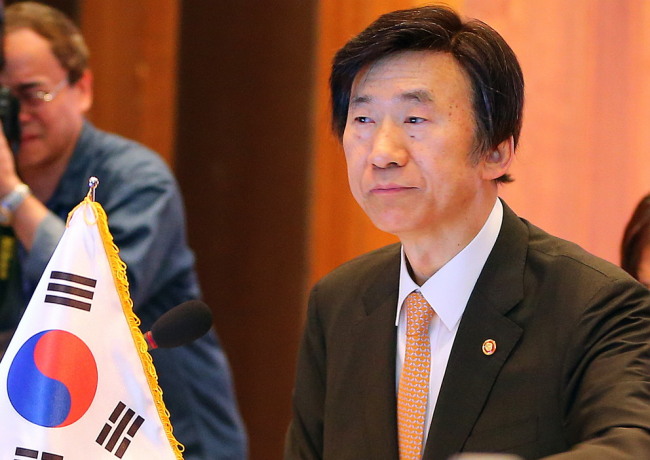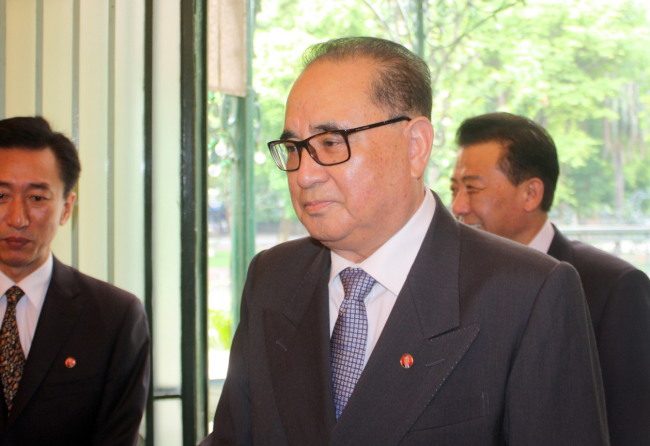The two Koreas are poised to engage in a diplomatic game at a security forum in Myanmar this week as Seoul seeks to bring regional players on board to press the North to part with its nuclear programs, while Pyongyang steps up its charm offensive.
The ASEAN Regional Forum will bring together the U.S., China, Russia, Japan and other major powers in addition to the 10-nation Southeast Asian coalition. The region’s largest security conference is slated for Sunday in Naypyidaw.
The 27 member countries will release a chairman’s statement at the close of the meeting, which addresses various security issues ranging from the situation on the Korean Peninsula to the Ukraine crisis to the sovereignty feuds in the East and South China seas.
Last year, the delegates delivered a stronger-than-usual voice in articulating their concerns over North Korea’s nuclear ambition and urging it to “comply fully” with its international obligations. Seoul will again push for greater pressure on Pyongyang, with all members of the stalled six-party denuclearization talks taking part.
“Our focus is on addressing the North Korean nuclear issue and rallying the international community against its provocations including nuclear and missile tests,” a senior official at Seoul’s Foreign Ministry told reporters on Wednesday on customary condition of anonymity.
“Last year’s ARF came shortly after the North’s third nuclear test and thus played a critical role (in piling pressure on North Korea).”
But the annual forum has traditionally gained traction for bilateral consultations and off-the-cuff talks between participants on its sidelines.
Foreign Minister Yun Byung-se plans to hold separate meetings with his counterparts from the U.S., China, India, Canada and other countries.
 |
Yun Byung-se |
He will also likely have his first chance to encounter his newly appointed North Korean counterpart, Ri Su-yong, who is making his debut on the multinational diplomatic scene.
Another highlight could be talks between Yun and Japanese Foreign Minister Fumio Kishida, in addition to a three-way consultation including U.S. Secretary of State John Kerry. Seoul officials say that they have received no offer from Tokyo and nothing has been confirmed, but Yun and Kishida are expected to gather to discuss ways to put back on track the two countries’ severely damaged ties.
Ri, for his part, is likely to strive to foster rapport with and drum up support for its policy from traditional partners as Pyongyang ramps up its charm offensive around the region.
 |
Ri Su-yong |
The former ambassador to Switzerland and the Netherlands is currently in Vietnam as part of his first ASEAN tour that included a stop in Laos and will take him to Indonesia, Singapore and Brunei through Aug. 17.
On the margins of the ARF, Ri is seeking to meet separately with the top diplomats of China, Myanmar and Mongolia, the Seoul official said.
Ri’s possible gathering with Japan’s Kishida could be the most striking feature. Tokyo has lifted some sanctions against North Korea after Pyongyang launched a probe into its abduction of Japanese citizens in the 1970-80s in line with their breakthrough agreement in Stockholm in May.
But any bilateral talks between Yun and Ri appear unlikely this year given icy cross-border relations, officials say. Kerry also has “no plan” for a meeting with Ri, U.S. State Department spokesperson Jen Psaki has said.
While attending the 2011 conference in Bali, the two Koreas’ foreign ministers ― then Kim Sung-hwan and Pak Ui-chun ― held an unofficial meeting following nuclear talks between their chief envoys to the six-party talks.
“It will be difficult for North Korea to reap concrete profits or results through this tour. It seems to be aimed instead at building relationships with ASEAN countries after Ri took office, which serve as rare doors to the outside world for North Korea,” said Lee Jae-hyon, an ASEAN and Oceania studies expert at the Asan Institute for Policy Studies.
“The competition between the two Koreas at the ARF will not likely be as evident this year as in the past, with few major issues standing out in their relations. But the South may bring up the issue of North Korea’s short-range missile launches, while the North could seek to add to the agenda its participation in the upcoming Asian Games (in Incheon).”
By Shin Hyon-hee (
heeshin@heraldcorp.com)









